5901 Botham Jean Blvd, Dallas, TX 75215
The Ultimate Guide to Free Scrap Metal Pickup and Recycling in Your Area
August 21, 2025Each year, millions of tons of metal waste end up in landfills across America, despite being recyclable. Free scrap metal pickup programs present a straightforward solution to this environmental issue. These community-based initiatives collect unwanted metal items directly from homes or businesses at no cost.
Metal recycling provides significant environmental benefits. Recycling one ton of steel conserves 2,500 pounds of iron ore, 1,400 pounds of coal, and 120 pounds of limestone. Through these pickup programs, old appliances, metal furniture, and construction scraps transform into valuable resources instead of waste.
Local recycling companies, scrap yards, and municipal waste management departments typically operate these free services. They recognize the value in metal waste and offer convenient collection to encourage responsible disposal. Finding the right program in your area can make recycling unwanted metal items more accessible than ever.
What Types of Scrap Metal Can Be Recycled?
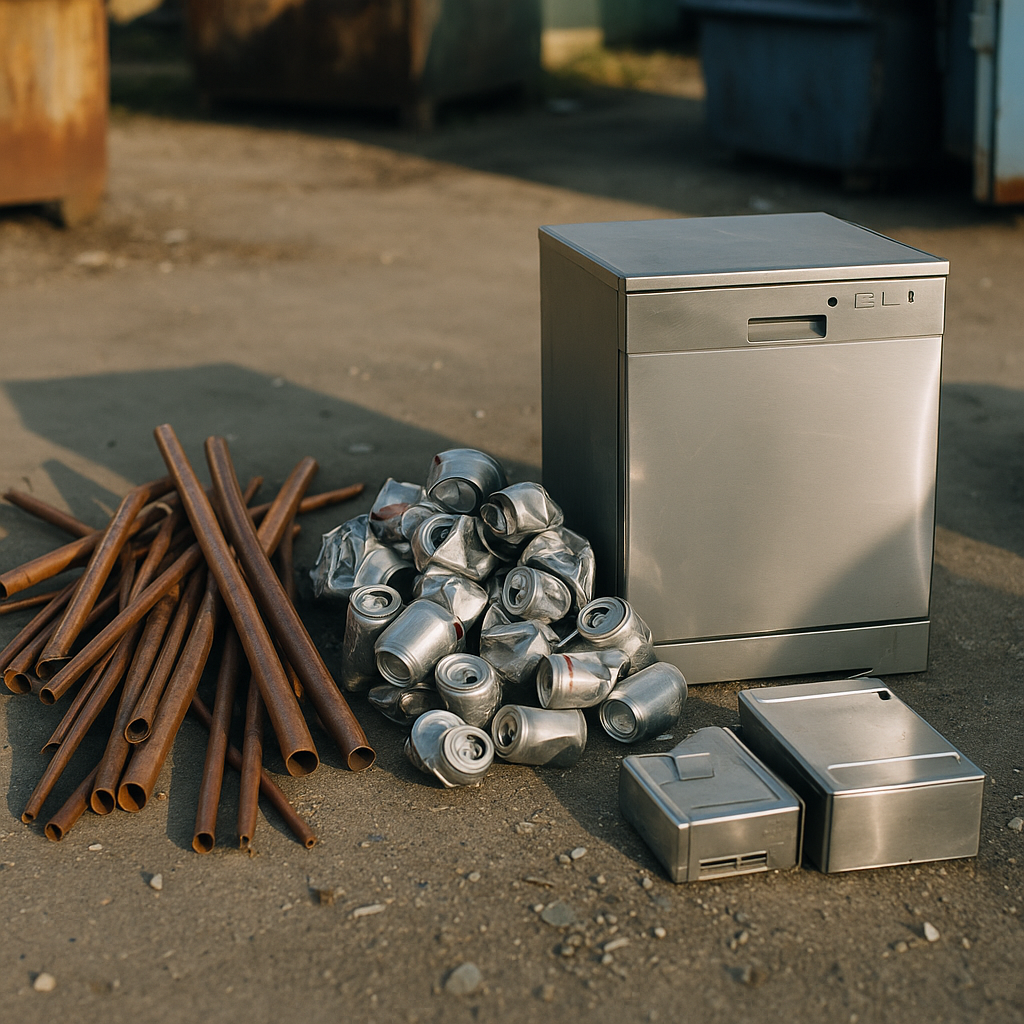
Scrap metal recycling programs accept a variety of metals, each with unique properties and values in the recycling market. Understanding these differences helps ensure your metal waste is properly processed, contributing to environmental conservation efforts.
Ferrous Metals
Ferrous metals contain iron as their primary element and are magnetic. These metals are central to many industrial applications due to their strength and durability.
- Steel: Found in appliances like refrigerators and stoves, construction materials, vehicles, and everyday items. Steel is highly recyclable and can be made into new products without losing quality.
- Iron Scrap: Common in outdoor furniture, cast iron cookware, pipes, and railings. Recycling iron conserves significant energy compared to mining raw materials.
- Rotors and Drums: These heavy vehicle components are valuable in the recycling stream and are commonly accepted by scrap yards.
Recycling ferrous metals is impactful, as the U.S. processes enough ferrous metal daily to construct the equivalent of 25 Eiffel Towers. These materials are typically traded by the ton.
Non-Ferrous Metals
Non-ferrous metals don’t contain iron, aren’t magnetic, and usually fetch higher prices per pound than ferrous metals. They are valued for their resistance to corrosion, malleability, and conductivity.
- Aluminum: Recycled worldwide, found in beverage cans, siding, car parts, window frames, and cookware. Recycling aluminum saves up to 95% of the energy needed to produce new aluminum.
- Copper: Highly conductive and found in electrical wiring, plumbing fixtures, roofing materials, and electronics. Copper varies in grade, with bare bright copper being the most valuable.
- Brass: A copper-zinc alloy found in plumbing fixtures, musical instruments, decorative items, door handles, and ammunition shells. Its density makes it valuable even in small quantities.
- Bronze: An alloy primarily of copper and tin, used in hardware, musical instruments, marine applications, and decorative items. Its corrosion resistance adds value.
- Lead: Found in batteries, bullets, weights, and roofing materials. Despite its toxicity, lead is one of the most recycled metals, with batteries having a recycling rate over 99%.
Identifying the type of metal you have is simple. The magnet test is the easiest method—if a magnet sticks, it’s ferrous; if not, it’s non-ferrous. This distinction helps recycling facilities properly sort and process materials.
| Metal | Applications |
|---|---|
| Steel | Construction materials, vehicles, appliances, and everyday items |
| Aluminum | Beverage cans, siding, car parts, window frames, and cookware |
| Copper | Electrical wiring, plumbing fixtures, roofing materials, and electronics |
| Brass | Plumbing fixtures, musical instruments, decorative items, and door handles |
| Bronze | Hardware, musical instruments, marine applications, and decorative items |
| Lead | Batteries, bullets, weights, and roofing materials |
Understanding the types of metals accepted by your local recycling program is crucial for effective recycling. Many scrap yards and recycling centers provide specific guidelines for preparation, such as removing non-metal attachments or separating different metal types, to maximize both environmental benefits and potential payment for your scrap.
How to Find Free Scrap Metal Pickup Services in Your Area
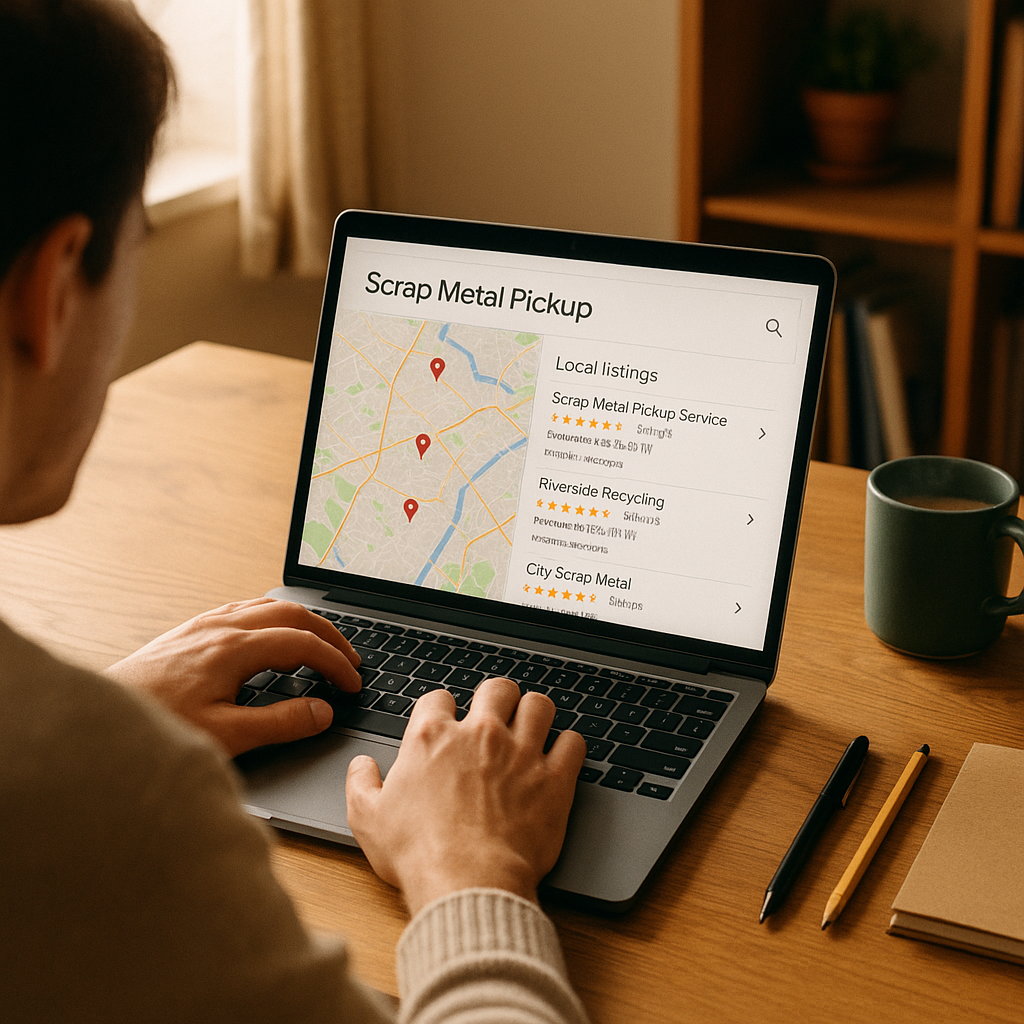
Finding free scrap metal pickup services can save you time and effort while ensuring your materials are properly recycled. The key is knowing where to look and how to connect with legitimate services. Here are several effective methods to locate these valuable resources in your community.
Contact Your Local Waste Management Department
Your municipal waste management department is an excellent starting point. Many cities partner with recycling facilities to divert metal from landfills. Call your city’s public works or environmental services division and ask about scrap metal collection programs.
Some municipalities offer scheduled pickup days specifically for metal items or can direct you to approved contractors who provide free collection services. These government-endorsed programs typically follow strict environmental regulations, ensuring your scrap is handled responsibly.
Research Local Recycling Centers and Scrap Yards
Recycling centers and scrap yards often offer free pickup services for substantial quantities of metal. The economic value of materials like copper, aluminum, and steel makes it worthwhile for these businesses to collect larger loads at no cost to you.
Create a list of scrap yards in your vicinity and contact them directly. Be prepared to describe the type and approximate quantity of metal you have. Many facilities have minimum weight requirements for free pickup, typically ranging from 100 to 500 pounds, depending on the material.
Utilize Online Recycling Databases
Several online platforms can help you locate free scrap metal collection services. These databases allow you to search by location and material type to find appropriate recycling options. Some reliable resources include:
- Earth911’s Recycling Locator tool
- Local waste management websites
- Recycling center directories
When using these platforms, filter your search specifically for metal recycling and note which facilities mention free pickup options. Some services may require you to complete an online form describing your materials before scheduling a collection.
Check Social Media and Community Groups
Social media platforms and community forums often connect people with local scrap collectors. Many independent scrappers actively look for free sources of metal and will gladly collect your materials without charge.
Search for terms like “scrap metal collection” or “free metal pickup” in local Facebook groups, community boards, or neighborhood apps. Verify the collector’s legitimacy before arranging a pickup to ensure safety and reliability.
Contact Local Trades and Contractors
Electricians, plumbers, and construction companies sometimes offer free scrap metal removal as a courtesy service or to supplement their income through recycling. These professionals already have established relationships with recycling facilities and the means to transport bulky items.
Reach out to local contractors, especially those working on nearby projects, to see if they’re interested in collecting your scrap metal. This approach works particularly well for renovation debris or when disposing of larger metal items.
Legitimate scrap collectors should never charge you for picking up valuable metals like copper, aluminum, or brass. If someone requests payment for these services, continue your search for a more appropriate solution.
Preparing Your Scrap Metal for Pickup
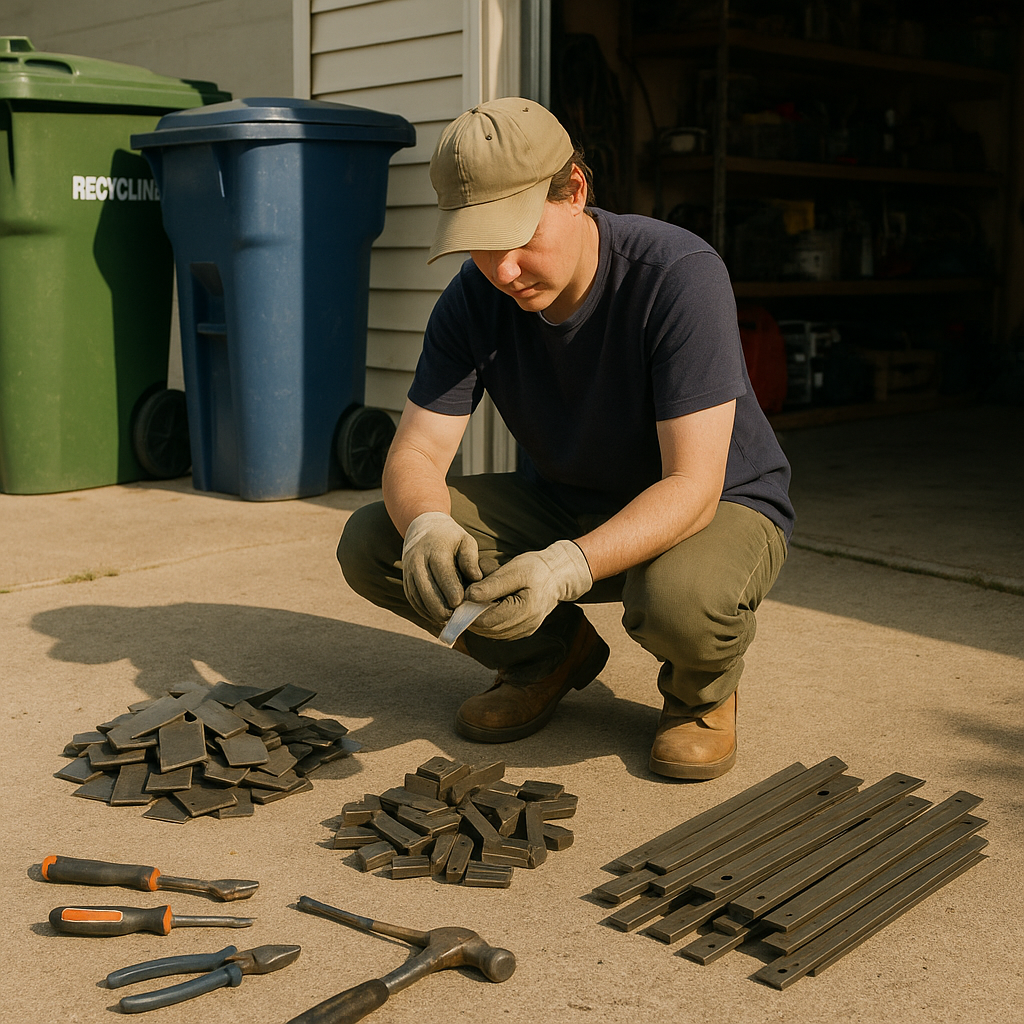
Proper preparation of scrap metal not only maximizes its recyclability but also enhances its value. Preparing your metals correctly ensures a smooth pickup process and helps recycling facilities process materials efficiently.
Sorting Your Metals
Separating your scrap metal by type is the first crucial step. Use a magnet to quickly identify ferrous (magnetic) and non-ferrous (non-magnetic) metals. Ferrous metals include steel and iron, while non-ferrous metals like copper, aluminum, and brass often command higher prices.
Store different metal types in separate containers to prevent mixing during transport. Organize metals into categories such as aluminum, steel, copper, and brass. This organization makes pickup more efficient and can increase the value of your scrap.
Removing Non-Metal Components
Remove all non-metallic attachments before recycling. Strip plastic handles from metal pots, remove rubber grips from tools, and strip insulation from copper wiring. This increases the purity of your scrap, significantly boosting its value.
For appliances, remove any electronic components, batteries, or non-metal casings. Refrigerators and air conditioners require special handling due to coolants. Many jurisdictions mandate professional handling of these substances before recycling.
Cleaning Your Scrap Metal
Clean visible dirt, grease, and debris from metal surfaces. Even a quick rinse can enhance the quality assessment of your materials. For items with stubborn dirt or rust, use a wire brush to remove surface contaminants.
Drain all fluids from automotive components and appliances. Empty oil, coolant, and fuel from lawnmowers and other equipment to prevent environmental contamination and make your scrap safer to handle.
Size Considerations
Some pickup services have size limitations for scrap metal items. Large pieces may need to be cut into smaller, more manageable sections. Check with your service provider about specific size requirements before scheduling a pickup.
For items like metal swing sets or sheds, disassembly is often required. Remove any concrete from fence posts or equipment legs. Roll chain link or wire fencing for easier collection and transport.
Special Item Preparation
Certain items require specific preparation:
- Appliances: Empty all contents, and secure or remove doors from refrigerators and freezers for safety.
- Lawnmowers: Drain all fuel and oil, and remove batteries if applicable.
- Metal furniture: Disassemble if possible to ease transport.
- Electronics: Remove batteries and non-metal components.
For heavy items like exercise equipment or file cabinets, place them in an accessible location for pickup. This consideration facilitates collection for the pickup crew.
Scheduling Your Pickup
Contact your recycling service provider in advance to schedule a pickup. Many services require at least 24 hours’ notice. Ask about special requirements for your items, especially larger ones.
Set out your prepared scrap metal by the designated time on collection day. Keep scrap metal separate from regular trash and recycling. Place items in a visible, easily accessible location for collection crews.
Safety Considerations
Wear protective gear when handling scrap metal. Heavy-duty gloves help prevent cuts from sharp edges, while safety glasses protect your eyes from debris. Steel-toed boots offer protection when moving heavier items.
Be cautious of sharp edges and points. Bend or cover particularly dangerous areas to protect both yourself and the workers handling your materials.
| Metal Type | Preparation Steps |
| Steel | Separate ferrous metals, remove non-metal attachments |
| Aluminum | Ensure non-magnetic separation, clean surface |
| Copper | Strip insulation, clean, and remove any non-metal parts |
| Brass | Remove non-metal attachments, clean thoroughly |
| Lead | Ensure clean surface, remove contaminants |
Benefits of Participating in Free Scrap Metal Pickup Programs
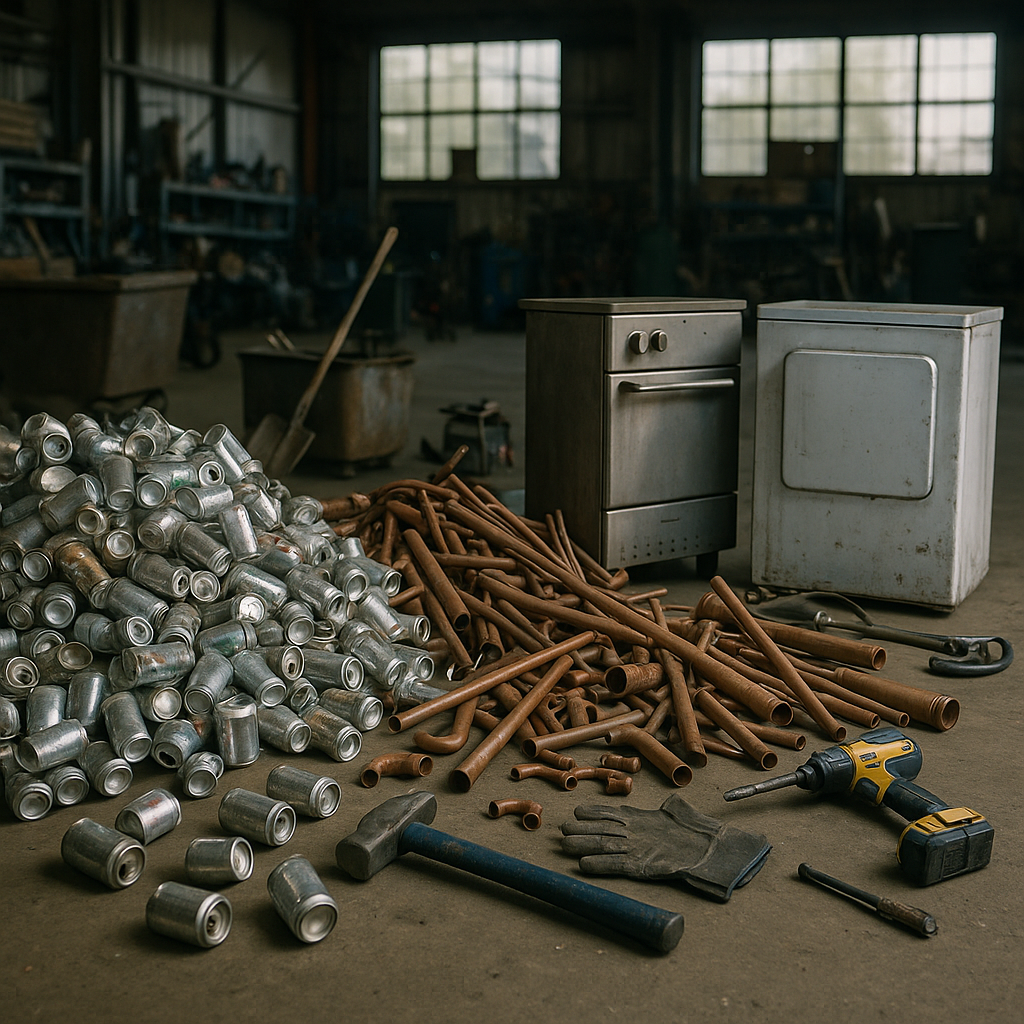
Free scrap metal pickup programs offer notable environmental and financial benefits. These services transform potential landfill waste into valuable resources, providing advantages from your doorstep to the global ecosystem.
Environmental Impact
Participating in free scrap metal pickup programs helps reduce landfill waste. Over 9 million tons of metal waste end up in American landfills each year. Each item recycled through these programs helps decrease this staggering figure.
These programs also protect soil and water quality. Improperly disposed metals in landfills generate leachate, a toxic liquid that forms when rainwater filters through waste, collecting contaminants. By using proper recycling channels, you prevent harmful substances from polluting local ecosystems.
Another crucial benefit is the conservation of natural resources. Recycling one ton of steel saves approximately 2,500 pounds of iron ore, 1,400 pounds of coal, and 120 pounds of limestone. This conservation extends to water resources, as metal recycling uses significantly less water than extraction processes.
Energy Conservation
The energy savings from scrap metal recycling are substantial. Manufacturing products from recycled materials requires much less energy than processing virgin ores. For aluminum, recycling saves up to 95% of the energy needed for production from raw materials, while recycling steel achieves around 60% energy savings.
These energy reductions directly lower greenhouse gas emissions. Recycling one ton of aluminum can prevent up to nine tons of carbon emissions. By participating in free pickup programs, you actively help combat climate change through these energy efficiencies.
The Northeast Recycling Council indicates that using recycled steel results in an 86% reduction in air pollution and a 76% reduction in water pollution. Your involvement contributes to cleaner air and water in your community.
Community Benefits
Free scrap metal pickup programs boost local economies by creating jobs in the collection, processing, and manufacturing sectors. The recycling industry generates billions of dollars annually and supports hundreds of thousands of jobs nationwide.
These programs also foster community pride and environmental awareness. When residents see recycling trucks regularly collecting scrap metal, it normalizes sustainable practices and motivates broader participation in environmental initiatives.
Many communities use the proceeds from metal recycling for local improvement projects. Revenue might support playground equipment, community gardens, or environmental education programs that benefit everyone. The Town of Saugerties exemplifies this by situating their collection program at the existing town transfer station, making participation convenient while generating resources for community projects.
Personal Advantages
Free pickup programs eliminate the inconvenience of transporting heavy metal items to recycling centers, making responsible disposal accessible for everyone, including those without suitable vehicles or the ability to move large items.
Some programs offer direct incentives for participation, such as cash payments based on weight and material type, discount vouchers for local businesses, or credits toward utility bills. Even without direct payment, the free removal service saves on disposal fees that might otherwise apply to large metal items.
Regular participation helps keep your property clean and organized. Removing unused appliances, equipment, and scrap metal frees up valuable space in garages, yards, and storage areas.
Supporting the Circular Economy
Participation in free scrap metal pickup programs makes you a vital part of the circular economy. Unlike many materials that degrade during recycling, metals can be recycled repeatedly without losing their properties, making scrap metal exceptionally valuable.
Your involvement helps transform the traditional take-make-dispose model into a sustainable cycle where materials maintain their value indefinitely. Metals from your old appliances, equipment, or renovation projects re-enter the production stream, reducing the need for resource-intensive mining operations.
This circular approach creates a more resilient local economy less dependent on imported raw materials. Communities with strong recycling programs become more self-sufficient and less vulnerable to supply chain disruptions.
| Metal Type | Environmental Benefit | Energy Savings |
|---|---|---|
| Steel | Saves 2,500 pounds of iron ore, 1,400 pounds of coal, and 120 pounds of limestone per ton recycled | Recycling saves roughly 60% energy |
| Aluminum | Saves up to 95% energy compared to production from raw materials | Recycling one ton can prevent nine tons of carbon emissions |
| Copper | Reduces water use by as much as 90% | Recycling uses up to 85% less energy compared to new production |
| Lead | 99% recycling rate, reduces hazardous waste in landfills | Significantly reduces energy required for new production |
| Alloyed Metals | Reduces need for virgin ore mining, mitigates soil degradation and water pollution | Recycling saves substantial energy, reducing reliance on fossil fuels |
Getting Started
Participating in free scrap metal pickup programs is straightforward. Most programs accept a wide variety of metals, including appliances, construction materials, electronics, and automotive parts. To maximize benefits, separate different types of metal when possible and remove non-metal components.
Contact your local waste management department to find programs in your area. Many municipalities offer regular collection days or on-demand pickup services. Preparation requirements vary by program, but generally, items should be clean and accessible for collection teams.
For businesses and properties with large amounts of scrap metal, dedicated collection containers may be available, offering convenient ongoing disposal options that turn waste management challenges into environmental opportunities.
Conclusion: Making the Most of Free Scrap Metal Pickup
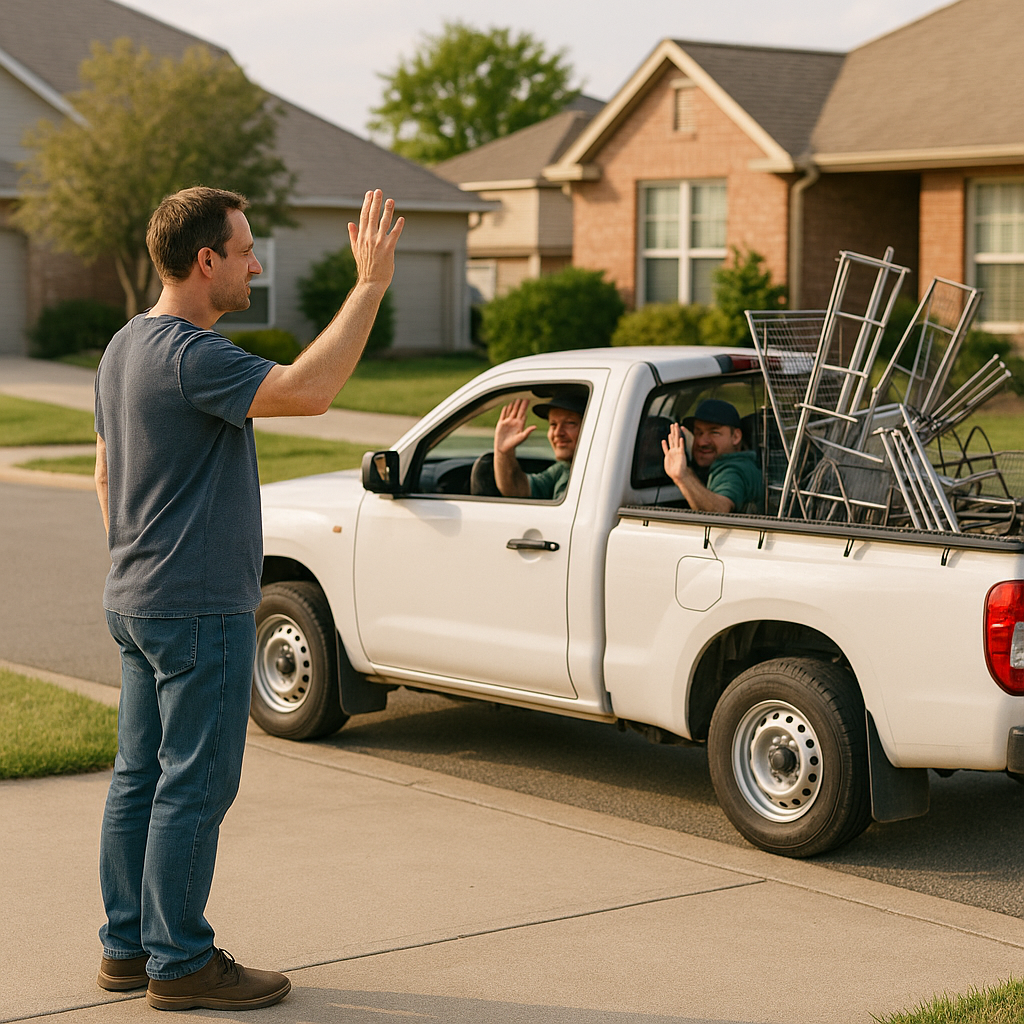
Free scrap metal pickup programs provide a convenient and responsible way to dispose of unwanted metal items. These programs play a key role in the recycling chain by diverting valuable materials from landfills and conserving natural resources. Recycling scrap metal through these services helps reduce energy consumption, lowers greenhouse gas emissions, and supports the circular economy.
To maximize these community resources, familiarize yourself with the accepted materials, identify reliable pickup services in your area, and prepare your items properly for collection. For expert guidance on recycling your scrap materials responsibly, contact Okon Recycling at 214-717-4083.
